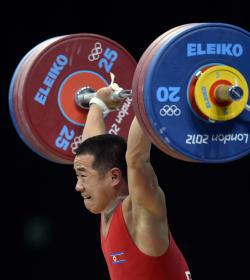After three full days of competition, the Olympics medal table holds a few surprises. After early successes in fencing and archery, Italy sits in the fourth spot with eight medals overall. Olympic host Great Britain, meanwhile, is tied for 10th with just one silver and two bronze. One of the countries that’s ahead of the Brits is, amazingly, North Korea. The DPRK has already won gold three times (tied for the third-largest haul behind China and the United States) and has four total medals—three in weightlifting and one in judo—tied for 8th overall.
How on earth could athletes from a nation of starving slaves perform so well? According to one of the gold-medal winners, the credit goes to North Korea’s recently departed dear leader. When Om Yun-chol won in the 56-kilogram weightlifting category on Sunday, having lifted three times his body weight and equaled the world record in the clean and jerk, he told the Olympic News Service, “I believe the great Kim Jong-il looked over me.”
In addition to the prospect of divine intervention, the Cold War contests between the United States and Eastern Bloc countries showed that ideologically motivated regimes often spend disproportionate amounts on achieving sporting glory. Clearly the North Korean Olympians are better nourished than the vast majority of their grass-eating compatriots. But according to a North Korea expert who recently spoke to the Guardian, sporting achievement is not central to the regime’s belief in its own superiority. Brian Myers, author of The Cleanest Race, told the paper:
“[I]n contrast to the Nazis, who considered the Aryan race not just morally and intellectually but also physically superior, North Korea claims only moral superiority. … It is not a huge problem for them if they are not capable of winning gold medals in various disciplines. If they get a few they will chalk that up to their unique moral strength and the athletes will thank the leader for inspiring them.”
More worryingly, the Guardian reported that at a May seminar in Pyongyang, which explored the connection between Kim Jong-il’s philosophy of juche (self-reliance) and sports, a speaker said North Korean officials and athletes should “give free rein to Korean-style rules and methods in every match.” Perhaps those Korean-style methods were afoot in the weightlifting competition. Om, who was ranked 11th in the world in 2011, chose to do his lifting early in the day with the less intimidating B group of lower-ranked strongmen, thus giving the event favorites a tough target to beat under the glare of the cameras eight hours later.
Let’s hope the nation known for playing chicken with nuclear weapons isn’t going too far beyond that level of gamesmanship in London. As Reuters recently reported, the North Korean Olympics gymnastics team was short-handed because two athletes were banned for falsifying their ages. And during the 2011 Women’s World Cup, five North Korean soccer players tested positive for steroid use, although Pyongyang authorities claimed “they were using traditional Chinese medicine of deer musk to treat players hit by a lightning strike.”
Thus far, the biggest obstacle the North Korean women’s soccer team has faced in London has been an erroneous display of the South Korean flag prior to their opening match. Might this have been a super-secret motivational ploy perpetrated by the DPRK government to motivate its athletes? Probably not, but I’ll be watching the flagpoles just in case.
